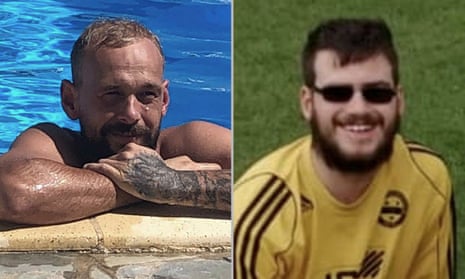Two more British men who fought for the Ukrainian armed forces and who are currently being held by pro-Russian troops in eastern Ukraine could face death sentences after they were accused of being mercenaries.
Russian-backed prosecutors in the occupied territories of Ukraine have charged Andrew Hill and Dylan Healy with “forcible seizure of power”, and undergoing “terrorist” training, according to a state news agency in Russian-controlled Donetsk.
The charges sparked a furious response from the British government. “We condemn the exploitation of prisoners of war for political purposes and have raised this with Russia,” a spokesperson for the Foreign Office said in a statement. “We are in constant contact with the government of Ukraine on their cases and are fully supportive of Ukraine in its efforts to get them released.”
Under the Geneva conventions, captured combatants should be humanely treated at all times. Human rights campaigners accused Russia of exploiting their capture in order to exert diplomatic pressure on the west.
“The chances of Healy and Hill receiving a fair trial in either the Donetsk People’s Republic or in Russia itself are vanishingly small,” said Kristyan Benedict, Amnesty International UK’s crisis response manager. “Unless the authorities present clear evidence that Healy and Hill are implicated in war crimes, this sham judicial process should be halted immediately.”
Hill, who was identified as a father of four from Plymouth, has been paraded on Russian television in several clips, including one that aired last month with the headline: “Exclusive – before the execution.”
In the clip, he appeared to have been told he may face criminal charges, saying that he was being “detained here as a suspected mercenary”.
Hill, who is reported to have previously served in the Lancaster regiment of the British army, was first shown on Russian TV after his capture in late April. In the video, the 35-year-old appeared to be severely injured, with his head bandaged and his left arm in a cast.
Healy, from Huntingdon, is reported to have been working in Ukraine as a humanitarian aid volunteer.
Two more Britons and a Moroccan were sentenced to death on identical charges by the authorities in Russian-controlled Donetsk.
A court on Thursday convicted 28-year-old Aiden Aslin, from Newark, 48-year-old Shaun Pinner, from Watford, and Brahim Saaudun on charges of “terrorism”. Observers said the process was intended to imitate the war crimes trials of Russian soldiers taking place in Kyiv.
No date has been set for the sentences to be carried out, and at least two of the men are appealing against the verdict.
Since Ukraine’s president, Volodymyr Zelenskiy, announced the formation of a foreign legion at the beginning of March, tens of thousands of people from around the world, some with a military background and many without, have arrived in Ukraine. It now amounts to the most significant international brigade since the Spanish civil war, when volunteers including leftwing intellectuals fought in communist-organised military units between 1936 and 1938 in support of Spain’s popular front government.
According to a Georgian commander who oversees operations involving foreign volunteers, about 3,000 British soldiers are fighting in Ukraine against Russian forces. Some have Ukrainian roots, while others are military veterans with no family ties who have decided to fight with Ukraine’s army.
Some countries have waived legal restrictions to allow people to fight. Latvia, a longstanding enemy of Russia, has lifted a 2014 ban on its citizens going off to fight with Kyiv. Germany and Canada have taken similar steps. While most volunteers are from North America and Europe, a few have come from countries such as Colombia, Japan and even Jamaica.
At the beginning of the invasion, the British foreign secretary, Liz Truss, was criticised for saying she would back Britons going to Ukraine to join the fight against the Russians, with Conservative colleagues saying this would be reckless and illegal. Her comments were soon contradicted by Downing Street and two weeks later Truss walked back her comment, saying she was just “expressing support for the Ukrainian cause”.
Ministry of Defence chiefs have banned all UK service personnel from travelling to Ukraine “until further notice”, saying any breach of the advice could lead to prosecution.
